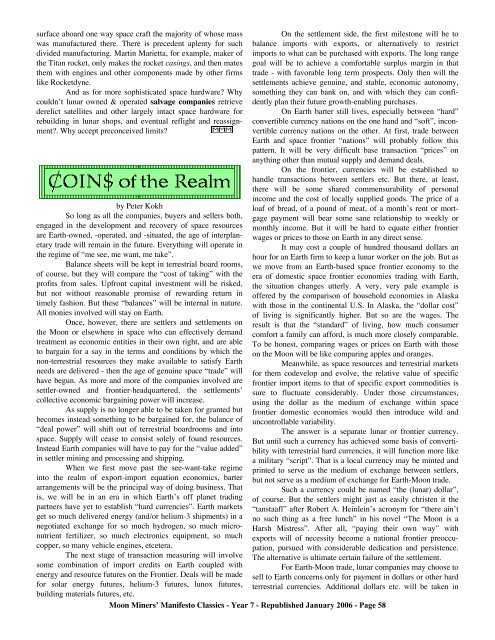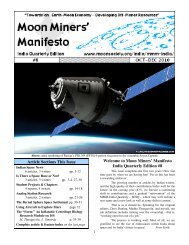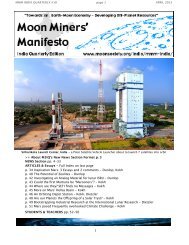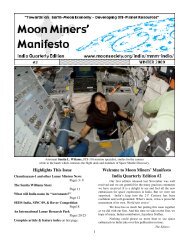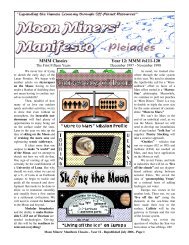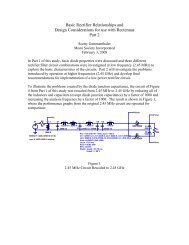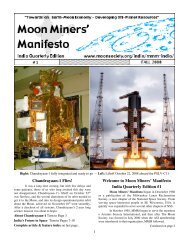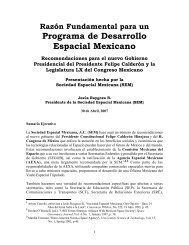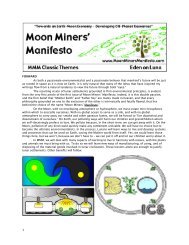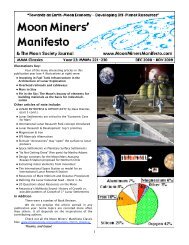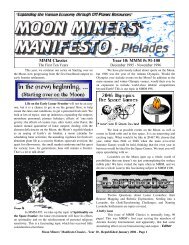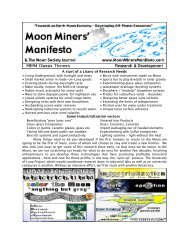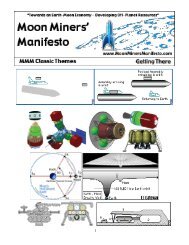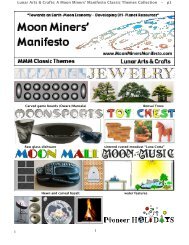surface aboard one way space craft the majority of whose masswas manufactured there. There is precedent aplenty for suchdivided manufacturing. Martin Marietta, for example, maker ofthe Titan rocket, only makes the rocket casings, and then matesthem with engines and other components made by other firmslike Rocketdyne.And as for more sophisticated space hardware? Whycouldn’t lunar owned & operated salvage companies retrievederelict satellites and other largely intact space hardware forrebuilding in lunar shops, and eventual reflight and reassignment?.Why accept preconceived limits?by Peter KokhSo long as all the companies, buyers and sellers both,engaged in the development and recovery of space resourcesare Earth-owned, -operated, and -situated, the age of interplanetarytrade will remain in the future. Everything will operate inthe regime of “me see, me want, me take”.Balance sheets will be kept in terrestrial board rooms,of course, but they will compare the “cost of taking” with theprofits from sales. Upfront capital investment will be risked,but not without reasonable promise of rewarding return intimely fashion. But these “balances” will be internal in nature.All monies involved will stay on Earth.Once, however, there are settlers and settlements onthe Moon or elsewhere in space who can effectively demandtreatment as economic entities in their own right, and are ableto bargain for a say in the terms and conditions by which thenon-terrestrial resources they make available to satisfy Earthneeds are delivered - then the age of genuine space “trade” willhave begun. As more and more of the companies involved aresettler-owned and frontier-headquartered, the settlements’collective economic bargaining power will increase.As supply is no longer able to be taken for granted butbecomes instead something to be bargained for, the balance of“deal power” will shift out of terrestrial boardrooms and intospace. Supply will cease to consist solely of found resources.Instead Earth companies will have to pay for the “value added”in settler mining and processing and shipping.When we first move past the see-want-take regimeinto the realm of export-import equation economics, barterarrangements will be the principal way of doing business. Thatis, we will be in an era in which Earth’s off planet tradingpartners have yet to establish “hard currencies”. Earth marketsget so much delivered energy (and/or helium-3 shipments) in anegotiated exchange for so much hydrogen, so much micronutrientfertilizer, so much electronics equipment, so muchcopper, so many vehicle engines, etcetera.The next stage of transaction measuring will involvesome combination of import credits on Earth coupled withenergy and resource futures on the Frontier. Deals will be madefor solar energy futures, helium-3 futures, lunox futures,building materials futures, etc.On the settlement side, the first milestone will be tobalance imports with exports, or alternatively to restrictimports to what can be purchased with exports. The long rangegoal will be to achieve a comfortable surplus margin in thattrade - with favorable long term prospects. Only then will thesettlements achieve genuine, and stable, economic autonomy,something they can bank on, and with which they can confidentlyplan their future growth-enabling purchases.On Earth barter still lives, especially between “hard”convertible currency nations on the one hand and “soft”, inconvertiblecurrency nations on the other. At first, trade betweenEarth and space frontier “nations” will probably follow thispattern. It will be very difficult base transaction “prices” onanything other than mutual supply and demand deals.On the frontier, currencies will be established tohandle transactions between settlers etc. But there, at least,there will be some shared commensurability of personalincome and the cost of locally supplied goods. The price of aloaf of bread, of a pound of meat, of a month’s rent or mortgagepayment will bear some sane relationship to weekly ormonthly income. But it will be hard to equate either frontierwages or prices to those on Earth in any direct sense.It may cost a couple of hundred thousand dollars anhour for an Earth firm to keep a lunar worker on the job. But aswe move from an Earth-based space frontier economy to theera of domestic space frontier economies trading with Earth,the situation changes utterly. A very, very pale example isoffered by the comparison of household economies in Alaskawith those in the continental U.S. In Alaska, the “dollar cost”of living is significantly higher. But so are the wages. Theresult is that the “standard” of living, how much consumercomfort a family can afford, is much more closely comparable.To be honest, comparing wages or prices on Earth with thoseon the Moon will be like comparing apples and oranges.Meanwhile, as space resources and terrestrial marketsfor them codevelop and evolve, the relative value of specificfrontier import items to that of specific export commodities issure to fluctuate considerably. Under those circumstances,using the dollar as the medium of exchange within spacefrontier domestic economies would then introduce wild anduncontrollable variability.The answer is a separate lunar or frontier currency.But until such a currency has achieved some basis of convertibilitywith terrestrial hard currencies, it will function more likea military “script”. That is a local currency may be minted andprinted to serve as the medium of exchange between settlers,but not serve as a medium of exchange for Earth-Moon trade.Such a currency could be named “the (lunar) dollar”,of course. But the settlers might just as easily christen it the“tanstaafl” after Robert A. Heinlein’s acronym for “there ain’tno such thing as a free lunch” in his novel “The Moon is aHarsh Mistress”. After all, “paying their own way” withexports will of necessity become a national frontier preoccupation,pursued with considerable dedication and persistence.The alternative is ultimate certain failure of the settlement.For Earth-Moon trade, lunar companies may choose tosell to Earth concerns only for payment in dollars or other hardterrestrial currencies. Additional dollars etc. will be taken inMoon Miners’ Manifesto <strong>Classics</strong> - <strong>Year</strong> 7 - Republished January 2006 - Page 58
from tourists. This pool of Space Dollars (akin to Euro Dollars)could then be used to pay for imports.As Frontier domestic economies grow in size andstability, however, some form of “solar credits” or “drawingrights” will come into being. This may be based on a preciouscommodity whose supply is not affected by the opening of thespace frontier - if there is such a commodity - or perhaps on thecost of a set “market basket” of items delivered to a middle-ofthe-gravity-gradientlocation such as low Earth orbit. Or, sucha systemwide currency could be valued in terms of some muchtraded commodity whose price has proven relatively stableover the long term. This could be hydrogen or copper orhelium-3 or platinum - it is hard to guess. .FOR SALE: Unforgettable Experiences& Unequaled Opportunitiesby Peter KokhProfits from space tourism to be plowed back into theLunar economy, can be earned for the Moon only to the extentthat the tourist operations involved are owned, operated, andequipped by settlers. If at first this seems an unlikely scenario,consider the cost of building tourist resorts in LEO [Low EarthOrbit] from materials brought up from Earth in comparison tocruder yet comparable facilities built of materials processedfrom lunar regolith - the twenty-fold savings in freight chargeswill tip the edge to companies able to supply the latter, oncethe necessary upfront capital investments have been made.Initial LEO resorts prefabricated on Earth will besmall, however luxurious. Ample and spacious complexes ableto accommodate a much wider range of activities (read zero-Gsports and recreation) will have to await the breakthrough inconstruction costs promised by NTMs — Non-TerrestrialMaterials. Compare 50s era Las Vegas resorts with those oftoday and multiply the difference by a hefty factor!That said, earnings from the use of lunar materials tosupport expanded tourist opportunities in space will only flowinto lunar accounts to the extent that the building materialsmanufacturers and construction companies involved are settlerownedand/or settlement-taxed. Unfortunately, there are amplepast models for exploitative colonialist rape-theft of foreignresources to give us ample warning that without the properlegal-political-economic regime in place, space frontier settlerscould well end up not seeing a penny of the profits. Indeed,some of these unsavory practices have been at least implicitlyadvocated in development schemes put forward by some spaceadvocates emotionally opposed to surface settlement by“planetary chauvinists”.Assuming that we set things up right however, theconstruction, outfitting, and servicing of tourist facilities inLEO should provide a major market for the lunar economy.After all, tourists are the one thing it is far more profitable tosource from Earth than from off-planet! And LEO is theirhandiest, least expensive “off shore” destination.“Build it and they will come” — for the rocket-thrustexperience of liftoff, for the sensation of weightlessness, andfor the angelic, olympian views. Those not plagued by spacesicknesswill get “the experience of a lifetime” promised by thehype ads. As ticket prices moderate and demand increases itwill become profitable to offer “enhanced” orbital vacations.Exercise, sport, and even dance classes and eventswill exploit the opportunities of weightlessness. To make themost of the unparalleled views, there will be both “heads-up”view-plate display aids and experienced human guides to helpsightseers identify and understand the geographical, geological,ecological and environmental, geoeconomic, and meteorologicalclues in the brilliantly sunlit panoramas below.Picking out major and minor cities by their nightlights will be a popular pastime. For astronomy buffs, thetwinkle-free brilliance of the quickly shifting starscapes willbring a foretaste of heaven.The leap from Earth Orbit tours to deep space excursionssuch as lunar swingbys is relatively easy. [<strong>MMM</strong> # 21Dec. ‘88 pp 2-5 “Lunar Overflight Tours” available by SASEplus $1 to “LRS”] If part of the vehicles (and their outfitting)involved is “Made on Luna”, some of the revenues from thisextension business will help boost the lunar economy. Betteryet if the companies serving this trade are settler-owned.Tours to the L4 and L5 Earth-Moon co-orbital fields,which may be the site of considerable construction and manufacturingactivity and boast settlements of their own, will alsobecome popular early extensions of LEO tour stays. From thesetwin vantage points, Earth and Moon can be seen together, 60°apart, and in similar phases (new, half, full, etc.). Excursionsstill further out may also be available.As to “land excursions” on the Moon, in the earlydays when the preoccupation will be with building and establishingthe first settlements and coaxing them toward somedegree of self-sufficiency, it may not be possible to “visit” theMoon except on “working tours” as part of construction orprospecting crews, much as people now pay to go on archeological“digs”. Eventually, traditional “pampered tourist” typevacations will be introduced.Such offerings will probably await the day when anyand all new pressurized habitable space on the Moon isconstructed of materials processed from the local regolith soils.Until then, the per square foot cost of habitat prefabricated onEarth will be much too high to squander on tourist activity foranyone other than the obscenely well-to-do.For sightseeing surface excursions, pressurized cabinsretired from Earth-Moon ferries and fitted with wheeledchassies and suitable motor units [“toads”, cf. <strong>MMM</strong> # 48 SEP‘91 pp. 4-6 “Lunar Hostels: Part I: Amphibious Vehicles]should be available as sleep-on go-anywhere coaches. Theymight be brightly colored (“Tangerine Toads”?) for safe visibilityin the overly gray setting, operated by a commercialdistant cousin of Greyhound (Grayspan?).As for touring Mars, that is an altogether different setof ifs. It is unlikely there will be any sort of tourist activity outthat far until tested and proven second generation nuclearMoon Miners’ Manifesto <strong>Classics</strong> - <strong>Year</strong> 7 - Republished January 2006 - Page 59
- Page 1 and 2:
MMM ClassicsThe First Ten YearsYear
- Page 3:
the eventual rise of intelligence s
- Page 6 and 7:
In reality, most of our conjectured
- Page 8 and 9: and time mean nothing. The message
- Page 10 and 11: economies, and set up patterns by w
- Page 12 and 13: ice sheet and glaciers are blocked
- Page 14 and 15: InnerSolarSystemTradeRoutesby Peter
- Page 16 and 17: From “dust in”to products out:t
- Page 18 and 19: port planet December 7th, 1992. As
- Page 20 and 21: 1. Fe - Iron and SteelIron, as it w
- Page 22 and 23: By Peter Kokhce RAM ics: [Greek ker
- Page 24 and 25: of potassium, sodium, and calcium),
- Page 26 and 27: supply the range of functional micr
- Page 28 and 29: • Lesson #3: Making a biosphere v
- Page 30 and 31: additions to the total biomass of t
- Page 32 and 33: pursuing such a mandate faithfully
- Page 34 and 35: The Jekyl-side of a Moon-available
- Page 36 and 37: Now the “Tonnage Of Imports Defra
- Page 38 and 39: eassigned and/or cannibalized is su
- Page 40 and 41: power). In every case, the Utility
- Page 42 and 43: The order of the day will be to min
- Page 44 and 45: “A question of not wasting spent
- Page 46 and 47: large amounts of carbon and nitroge
- Page 48 and 49: these cycling systems through this
- Page 50 and 51: capital equipment and discharge and
- Page 52 and 53: edible tofu-like product that can b
- Page 54 and 55: for a Wheeled Space StationBy Peter
- Page 56 and 57: On the Moon, the cheapest fabric wi
- Page 60 and 61: ockets are available that can signi
- Page 62 and 63: Eastern Sea (misnamed because it is
- Page 64 and 65: ◊ What are the power options avai
- Page 66 and 67: Of course, there can be no protrudi
- Page 68: planetary scientists will lead them


